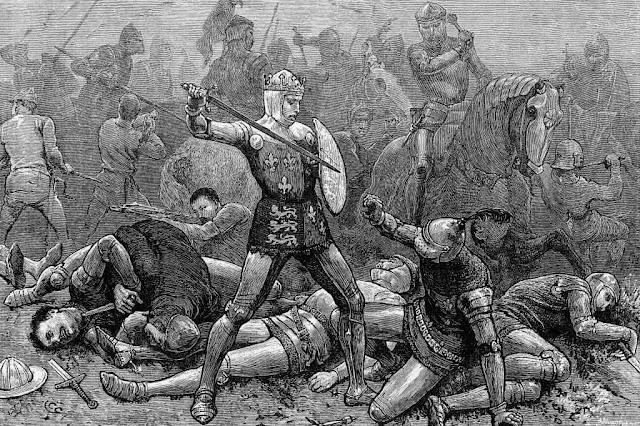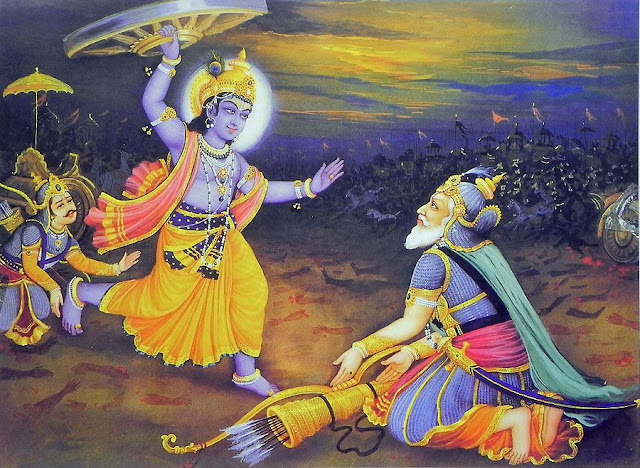The cause of Mahabharata! Could Bhism Pitamah had subverted the War?
By - Abhudai Pal
Bloodshed! Bloodbath!
Hue and Cries!
The whimpering of widows!
The grave silence!
Broken families and civilization decimated!
 |
| Pic credit to the rightful owner. |
Just imagine a scene with the above situation(s). You will shudder! And, you should cry, regret, repent, shout, and feel the agony in your arteries and veins.
What led to the birth of such a scenario?
Is it because of an individual's ill-intention?
Could this be prevented?
In my mind, plenty of questions arises regarding such dystopia.
The answer to all of my questions is just one word.
"WAR"
It is the WAR that gave birth to these scenarios. Who wins in a war? I do not know! However, it is the entire humanity that loses because of a WAR.
If I had told you, the WAR I am talking about could have been prevented just because of one person. And that person stayed silent because of his commitments.
Would you revere him?
I am talking about India's most famous Epic, "THE MAHABHARATA."
Who was the cause of the War?
Draupadi's comment on Duryodhana, Pandava's overly-forgiving nature, Maharaja Dhritrastra's blind love for his son, or Pandu's denial to be a king?
 |
| Pic credit to the rightful owner. |
If you have read/seen Mahabharata, you will agree that Bhism, the son of King Shantanu, was the man of courage and valor, thus invincible.
He promised his stepmother Satyavati that he would pursue the life of penance. He committed himself to work as a guardian/servant to the throne of Hastinapur. He has one dream, to witness justice (NYAYA) and righteousness (DHARMA) rule the Hastinapur.
Besides his commitment to the throne, Bhism was undefeatable; his Guru "Purshuram" could not even defeat him in a war.
However, the sorrowful part of the entire Epic is that he failed to subvert a war despite being invincible. Consequently, he witnesses the death of his own nephews, their sons, and grandsons.
The only problem with Bhism is not abiding by the commitment. The trouble began when he blindly followed the orders of the King and thus implicitly supported the throne of Hastinapur.
 |
| Pic credit to the rightful owner. |
The Hastinapur King was blind not only by birth but by choice too. Dhritarashtra's blind love for his son cost him his son's life.
The War was not abrupt. However, it was allowed to be brewed with events.
The events like,
1) Poisoning Bheem and throwing him into the river
2) The bombardment of stones on Arjun when he returned after completing his "ashram Shiksha."
3) Plot to Kill Pandavas with their mother in Lakshagrah.
4) Denying Pandavas their right to 50% of Hastinapur Kingdom by Kauravas
5) Disrespecting Draupadi in front of entire Gatherings
Do you think all of them were destined to happen?
No, they were incentivized to happen. An incentive of not getting punished. If Bhim Pitamah had chosen to revolt against the throne after the 1st incident.
Do Kaurava's ever dare to reach up to the 5th incident?
Obviously NO.
The silence of Bhism costs him to the extent that he heard the hue and cries of his own daughter-in-law in the gathering. That, too, was caused by the people he was committed to defending.
 |
| Pic credit to the rightful owner. |
Thinking objectively, To say that BHISM is the cause of War is in no way an underestimation.
And which throne did he serves when he saw his daughter-in-law getting stripped? This was not his commitment.
The problem arises because Bhism abides by his commitment to serving the throne and forgetting that he had to serve the throne that delivers justice and righteousness.
If he had just once revolted for the cause he chose to serve, i.e., justice and righteousness, the many families could have been saved. And most importantly, what the use of invincibility if you could not stand to your ideals.
Not every commitment needs to be followed.
Bhism attached himself to commitment emotionally, not rationally.
If the purpose of commitment is not served better to leave.
________________________________________
Please share this article. That will be your appreciation for the author.



Comments
Post a Comment